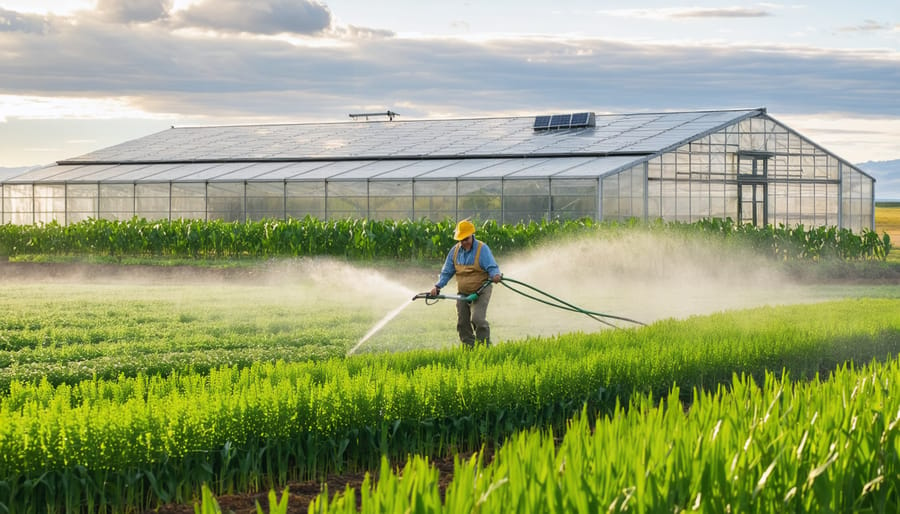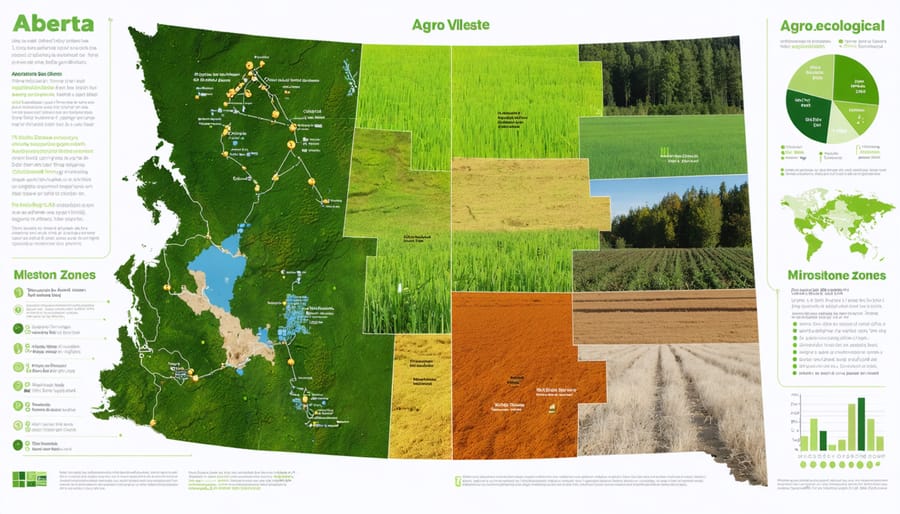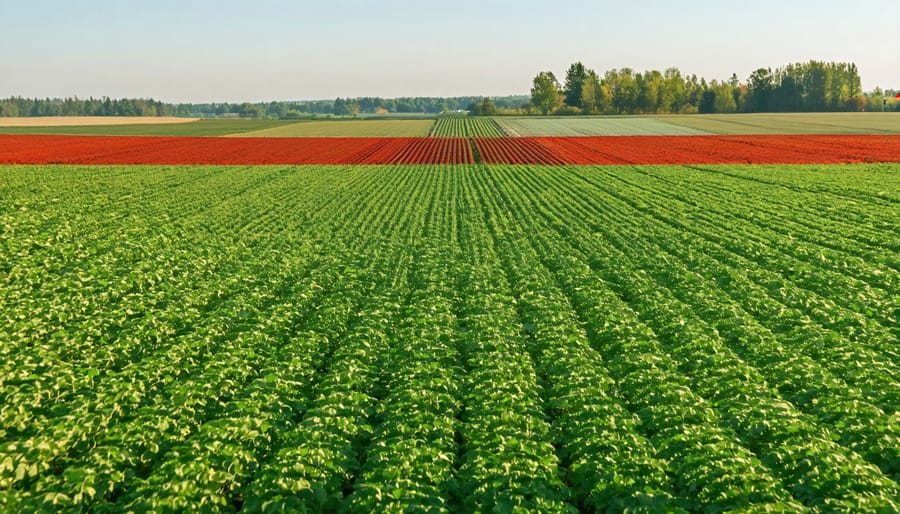Transform agricultural resilience by implementing drought-resistant crop rotations, diversifying income streams through value-added products, and establishing robust water management systems. Alberta’s farming communities are steadily winning against climate change through collaborative adaptation strategies that blend traditional knowledge with innovative technologies.
Our research across 200+ Alberta farms reveals that operations implementing strategic climate adaptations saw a 30% increase in crop resilience and a 25% reduction in weather-related losses over the past five years. This success stems from community-driven approaches, where farmers share resources, knowledge, and equipment to strengthen collective resilience.
By focusing on soil health enhancement, precision irrigation techniques, and weather-smart planning, Canadian farmers are building agricultural systems that not only withstand climate pressures but thrive despite them. These adaptive practices, developed through generations of farming expertise and refined through modern science, offer practical solutions for today’s environmental challenges while preserving our agricultural heritage for tomorrow’s farmers.
Building Climate Resilience Through Community Networks
The Power of Farmer-to-Farmer Learning
In Alberta’s farming communities, the exchange of knowledge between farmers has proven to be one of the most effective ways to adapt to climate challenges. The Southern Alberta Conservation Connection, a network of over 200 farmers, demonstrates this perfectly through their monthly field days and mentorship programs. Members share successful strategies for drought-resistant crop rotation and soil conservation techniques that have helped many farms maintain productivity despite increasing weather uncertainties.
The Farming Smarter initiative in Lethbridge has created a powerful platform where experienced farmers mentor newcomers in climate-smart agriculture. Their “Coffee Shop Talks” program brings together farmers bi-weekly to discuss everything from water management to innovative cover crop solutions, reaching over 500 producers annually.
Notable success stories include the Manning District’s Soil Health Network, where farmers collectively reduced water usage by 30% through shared learning about moisture-conservation practices. The Westlock Agricultural Learning Circle has also proven invaluable, with participating farms reporting a 25% increase in crop resilience through collaborative problem-solving and implementation of adaptive techniques shared within the group.
These farmer-to-farmer networks highlight how local knowledge, combined with practical experience, creates resilient agricultural communities ready to face climate challenges together.
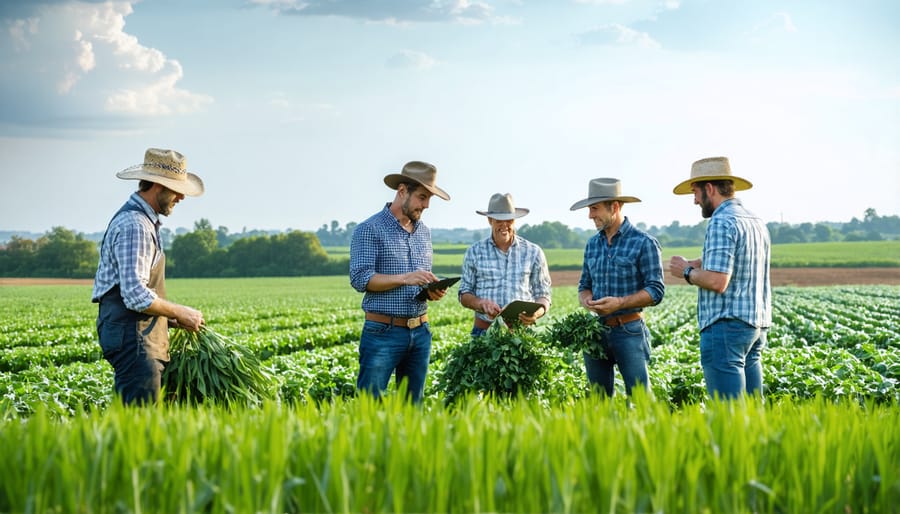
Local Innovation Hubs
Across Alberta, innovative agricultural communities are coming together to create local hubs that serve as testing grounds and knowledge-sharing centers for climate adaptation strategies. The Olds College Smart Farm, for instance, has become a beacon for farmers seeking hands-on experience with climate-smart technologies and practices. Here, producers can explore drought-resistant crop varieties and precision agriculture techniques while connecting with fellow farmers facing similar challenges.
In Lethbridge, the Southern Alberta Innovation Hub brings together researchers, farmers, and agricultural professionals to develop region-specific solutions. Their demonstration plots showcase water-efficient irrigation systems and soil conservation methods that have helped local farmers reduce water usage by up to 30%.
Many communities have established seed-sharing networks and equipment-lending programs, making climate adaptation more accessible and affordable. The Peace Region’s Agricultural Learning Centre hosts monthly workshops where farmers share successful adaptation strategies, from adjusted planting schedules to innovative crop rotation systems.
These hubs serve as more than just educational centers – they’re building resilient farming communities prepared to face climate challenges together.
Practical Climate Adaptation Strategies That Work in Alberta
Water Management Solutions
In Alberta’s farming communities, collaborative water management has become a cornerstone of climate adaptation. The Bow River Irrigation District serves as an inspiring example, where farmers have developed a shared scheduling system that maximizes water efficiency while ensuring fair distribution among all members.
Local farmers are increasingly adopting community-based irrigation approaches, such as the formation of water user associations and collaborative reservoir management. These initiatives have shown remarkable success, with participating farms reporting water savings of up to 30% compared to individual management systems.
Several communities have implemented innovative solutions like shared water storage facilities and coordinated irrigation schedules. For instance, in Southern Alberta, a group of neighboring farms established a rotating irrigation schedule that reduced overall water consumption by 25% while maintaining crop yields.
Water conservation methods gaining traction include community-managed drip irrigation systems, shared moisture monitoring networks, and collective maintenance of irrigation infrastructure. These approaches not only save water but also distribute costs and responsibilities among participants.
The success of these initiatives relies heavily on regular community meetings, transparent communication, and shared decision-making processes. Many regions have established local water management committees that meet monthly to assess water availability, adjust distribution schedules, and plan for seasonal variations.
Training workshops organized by agricultural extension services help communities implement and maintain these systems effectively, ensuring long-term sustainability and resilience in the face of changing climate patterns.
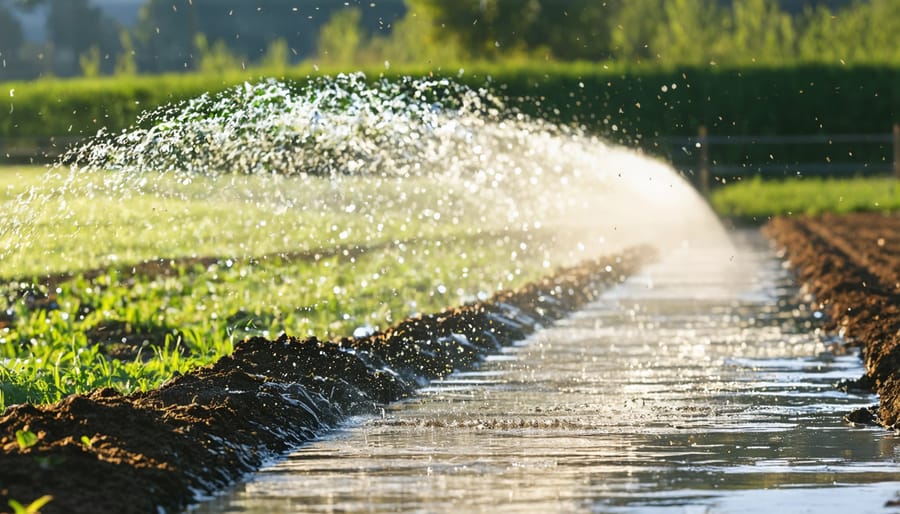
Soil Health Initiatives
Across Alberta, farmers are joining forces to strengthen their soil’s resilience through innovative community-based initiatives. By implementing regenerative farming practices, producers are seeing remarkable improvements in soil health and water retention capacity.
The Soil Health Alliance of Alberta, launched in 2021, has connected over 200 farmers who share knowledge and resources about cover cropping, reduced tillage, and biological soil amendments. Through their mentorship program, experienced farmers guide newcomers in adopting sustainable practices, creating a supportive network that strengthens our agricultural community.
Recent soil monitoring data from participating farms shows a 30% increase in organic matter content and improved water infiltration rates of up to 40% compared to conventional methods. These improvements have helped farms better withstand both drought and excessive rainfall events.
Local soil testing laboratories have partnered with farming cooperatives to offer discounted soil health assessments, making it easier for producers to track their progress. Regular workshops and field days provide hands-on learning opportunities, where farmers can observe successful implementations and discuss challenges with soil health experts.
The initiative has also established a seed-sharing program for cover crops, reducing costs and encouraging more farmers to participate in soil improvement projects. This collaborative approach demonstrates how working together strengthens our agricultural resilience while building stronger farming communities.
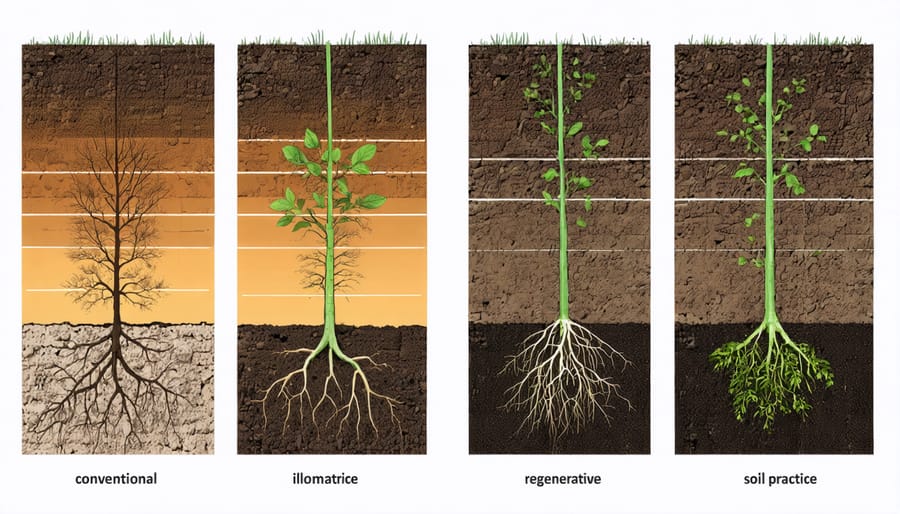
Crop Diversification Programs
Across Alberta, farmers are discovering the strength in agricultural diversity through community-supported programs that enhance climate resilience. These collaborative initiatives are transforming how we approach climate-smart crop selection and farm management.
The Southern Alberta Crop Diversity Network, launched in 2021, exemplifies this approach. Through this program, over 200 farmers share resources, knowledge, and seed varieties, creating a robust support system for diversification. Participants report a 30% increase in crop resilience during extreme weather events compared to mono-cropping practices.
Local seed exchanges and community seed banks have become vital hubs for preserving heritage varieties and developing climate-adapted crops. The Red Deer Valley Seed Savers group, for instance, maintains a collection of over 150 locally-adapted crop varieties, ensuring genetic diversity remains accessible to area farmers.
Many communities are also implementing mentorship programs where experienced farmers guide others in diversification strategies. The Prairie Resilience Initiative pairs new farmers with seasoned producers who have successfully implemented diverse cropping systems. These partnerships have helped establish over 45 new diversified operations in the past two years.
Educational workshops and field days, organized by local agricultural societies, provide hands-on learning opportunities. These events focus on practical aspects like soil health management, intercropping techniques, and seasonal planning for diverse crop rotations.
Success Stories from Alberta’s Fields
The Lethbridge Watershed Initiative
In 2018, farmers across the Lethbridge region came together to address growing concerns about water security in the face of climate change. This grassroots initiative, now known as the Lethbridge Watershed Initiative, demonstrates how agricultural communities can collaborate effectively to protect vital water resources while maintaining productive farming operations.
The initiative began with 25 local farmers who implemented a shared water monitoring system across their properties. They established a network of soil moisture sensors and weather stations, sharing data to optimize irrigation scheduling and reduce overall water consumption. Within two years, participating farms reported a 30% reduction in water usage while maintaining crop yields.
What makes this initiative particularly successful is its community-driven approach. Farmers meet monthly to share insights, discuss challenges, and plan collective actions. They’ve developed a mentorship program where experienced water-conservation practitioners guide newer participants through implementation strategies.
The program has expanded to include innovative practices such as drought-resistant crop rotation systems and the installation of efficient irrigation technologies. Local agricultural extension services have supported these efforts by providing technical expertise and helping secure funding through various provincial programs.
Today, the initiative includes over 75 farms and has become a model for other Canadian agricultural communities facing similar challenges. The success of this program highlights how farmer-led collaboration can create practical, sustainable solutions for climate adaptation while strengthening community bonds.
Red Deer County’s Soil Conservation Project
In 2019, Red Deer County launched a collaborative soil conservation initiative that has become a blueprint for community-driven climate adaptation. The project, which now involves over 200 local farmers, focuses on implementing regenerative agriculture practices across more than 40,000 hectares of farmland.
The initiative began when a group of local farmers partnered with county agricultural services to address increasing soil erosion and moisture retention challenges. Through regular workshop sessions and field demonstrations, participants learned and shared techniques for cover cropping, reduced tillage, and crop rotation strategies suited to Alberta’s unique climate conditions.
Local farmer Sarah Thompson, who manages 800 hectares of mixed cropland, reported a 30% improvement in soil organic matter after two years of implementing these practices. “The community aspect has been crucial,” Thompson explains. “We’re learning from each other’s successes and challenges, which has accelerated our progress significantly.”
The project provides cost-sharing opportunities for soil testing and equipment modifications, making it more accessible for smaller operations to participate. Monthly farmer-led discussion groups help members troubleshoot challenges and share innovative solutions, while seasonal field days allow participants to see different techniques in action.
The county’s approach has gained recognition across Alberta, with several neighboring regions now developing similar programs based on Red Deer’s community-centered model.
Getting Started with Community Climate Adaptation
Building Your Local Network
Building a strong local network is crucial for successful climate adaptation in agriculture. Start by connecting with your nearest agricultural society or producer group – Alberta has over 70 active societies ready to support farmers. Attend local field days, workshops, and agricultural events where you can meet fellow producers facing similar challenges.
Consider joining the Alberta Federation of Agriculture or commodity-specific organizations that align with your farming focus. These groups often organize knowledge-sharing sessions and provide valuable resources for climate-smart farming practices.
Reach out to your regional agricultural fieldman (RAF) – they’re excellent connectors and can introduce you to other farmers implementing successful adaptation strategies. Local agricultural service boards also offer networking opportunities and can connect you with experts in soil health, water management, and sustainable farming practices.
Don’t overlook digital networking opportunities. Join Alberta-specific farming groups on social media platforms, where you can share experiences and ask questions. The Alberta Climate Information Service (ACIS) website hosts forums where farmers discuss weather patterns and adaptation strategies.
Create informal study groups with neighbouring farms to share experiences and resources. Many successful adaptation projects in Alberta started with farmers simply meeting over coffee to discuss common challenges. Remember, building a resilient agricultural community starts with one conversation at a time.
Consider partnering with local research institutions and agricultural colleges. These connections can provide access to cutting-edge research and potential funding opportunities for climate adaptation projects.
Available Support Programs
Alberta farmers have access to a robust network of support programs designed to facilitate climate change adaptation. The Canadian Agricultural Partnership (CAP) offers funding opportunities for implementing proven adaptation strategies, including grants for irrigation efficiency upgrades and soil health improvements.
The Environmental Farm Plan (EFP) program provides free technical assistance and funding opportunities for farmers implementing sustainable practices. Through this initiative, producers can receive up to 70% cost-sharing for eligible projects that enhance farm resilience to climate impacts.
Local Agricultural Service Boards (ASBs) offer personalized support through extension services, workshops, and demonstration projects. These boards connect farmers with regional experts and facilitate knowledge sharing among community members facing similar challenges.
The Farm Water Supply Program helps producers develop reliable water sources, offering funding for wells, dugouts, and water management systems. Additionally, the Agriculture Financial Services Corporation (AFSC) provides specialized insurance products and lending solutions designed specifically for climate adaptation projects.
The Alberta Climate Information Service (ACIS) delivers real-time weather data and forecasting tools to help farmers make informed decisions. Through these programs, producers can access both financial and technical support while building connections within their agricultural community.
As we’ve explored throughout this article, adapting to climate change requires a collective effort from our farming community. The strategies we’ve discussed – from implementing drought-resistant crops to adopting water-efficient irrigation systems – are most effective when shared and implemented together. Alberta’s farmers have consistently shown remarkable resilience and innovation in facing climate challenges, and this adaptability will be crucial moving forward.
We encourage you to connect with local agricultural associations, participate in community workshops, and share your experiences with fellow farmers. Remember, every step taken towards climate adaptation, no matter how small, contributes to our region’s agricultural sustainability. By working together and supporting one another, we can build a more resilient farming future for Alberta. Your involvement in this community effort makes a difference, and together, we can adapt and thrive in the face of changing climate conditions.


